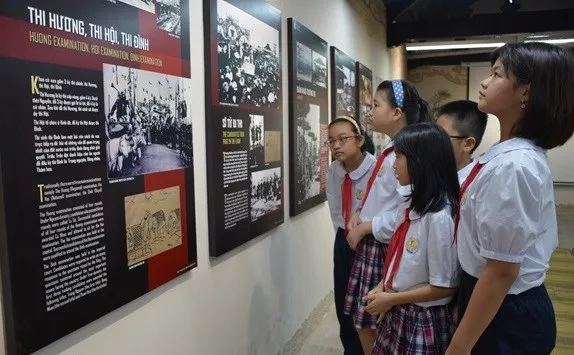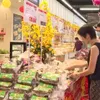Hanoi museums, relic sites strive to provide new experiences to visitors

Various new products and services have been provided by museums and relic sites in Hanoi with an aim to lure more visitors, especially youngsters, and promote their values at the same time.
Recently, Van Mieu-Quoc Tu Giam relic site has entertained young visitors with an exciting journey of “finding mascots on ancient architecture”, which is designed in the form of games on an iPad.
The game consists of six doors equivalent to six architectural styles of the relic sites, including Four Pillars, the Gate of the Temple of Literature, Dai Trung Gate, Khue Van Cac, Dai Thanh Gate and Bai Duong House.
Meanwhile, the Vietnam Fine Arts Museum has focused on building the iMuseum VFA multimedia voiceover application, which is available on both Android and iOS, using QR codes or identifiers for art works. The iMuseum VFA has outstanding features such as allowing visitors to view high-quality images of the works, read the contents of the introductions, locate artifacts, see display system diagrams, and distinguish rooms by colour.
With only a mobile phone or tablet with an internet connection and a fee for an application download, visitors can freely explore 100 typical works on the regular display system of the Vietnam Fine Arts Museum, in both direct and online forms, with multiple language options including Vietnamese, English, French, Chinese, Japanese, Korean, Spanish, Italian and German.
Based on the iMuseum VFA system, the Vietnam Fine Arts Museum has been developing many themed tours such as "Vietnamese Lacquer Painting" or "National Treasure", to help visitors easily access and “chat” with museum artifacts in a new way.
Duong Ngoc Ha from the Centre for Cultural and Scientific Activities under Van Mieu-Quoc Tu Giam (Temple of Literature) said the linkage between the displayed artefacts and the method of visiting and studying in the museum is undergoing a strong shift. It is a shift from being aware of a cultural experience as a form of information that a museum holds and transmits to visitors, to something that can be discussed and shared. A memorable experience is always a strong attraction because it gives visitors not only knowledge but also skills and emotions.
Director of the Hue Museum of Royal Antiquities Huynh Thi Anh Van said, in the context of the 4.0 revolution, the application of high technology to display and exhibit activities is one of the indispensable tools of advanced museums.
Currently, the trend of display and interpretation combined with interaction is now becoming popular in the world. New experiences for visitors can be enhanced with different forms of interpretation through interactive applications, or a combination of real artifacts and appropriate design images, thereby helping viewers feel the connection between personal perception and what they are seeing.
However, according to experts, technology is only a means to an end. They stressed the need for creative ideas, deep content and resources to carry out the ideas. They advised museums and monuments to focus on developing the quality of personnel and seeking suitable ways to call for economic and technological resources to jointly create attractive interactive products.





